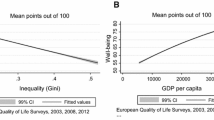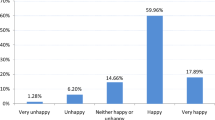Abstract
This paper explores the relationship between two well-established concepts of measuring individual well-being: the concept of happiness, i.e. self-reported level of satisfaction with income, and relative deprivation, i.e. the gaps between the individual’s income and the incomes of all individuals richer than him. Operationalizing both concepts using micro panel data from the German Socio-Economic Panel, we provide empirical evidence for subjective well-being depending more on relative deprivation than on absolute levels of income. This finding holds after controlling for other influential factors in a multivariate setting.
Similar content being viewed by others
References
Berrebi Z.M. and Silber J (1985). Income inequality indices and deprivation: A generalization. Quarterly Journal of Economics 100: 807–810
Brown, G.D.A., J. Gardner, A. Oswald and J. Qian (2005): Does wage rank affect employees’ wellbeing?, IZA DP No. 1505
Chakravarty S.R (1997). Relative deprivation and satisfaction orderings. Keio Economic Studies 34: 17–31
Chakravarty S.R., Chattopadhyay N. and Majumder A (1995). Income inequality and relative deprivation. Keio Economic Studies 32: 1–15
Chakravarty S.R. and Moyes P (2003). Individual welfare, social deprivation and income taxation. Economic Theory 21: 843–869
Chakravarty S.R. and Mukherjee D (1999). Ranking income distributions by deprivation orderings. Social Indicators Research 46: 125–135
Clark A.E. and Oswald A.J (1996). Satisfaction and comparison income. Journal of Public Economics 61: 359–381
Di Tella R. and MacCulloch R (2005). Partisan social happiness. Review of Economic Studies 72: 367–393
Duclos J-Y (2000). Gini indices and the redistribution of income. International Tax and Public Finance 7: 141–162
Duclos J-Y. and Grégoire P. (2002). Absolute and relative deprivation and the measurement of poverty. Review of Income and Wealth 48: 471–492
Easterlin R.A (2001). Income and happiness: towards a unified theory. Economic Journal 111: 465–484
Easterlin R.A. (2002). Happiness in Economics. Edward Elgar, Cheltenham
Ferrer-i-Carbonell A. and Frijters P. (2004). How important is methodology for the estimates of the determinant of happiness?. Economic Journal 114: 641–659
Frijters P., Haisken-DeNew J.P. and Shields M.A (2003). Investigating the patterns and determinants of life satisfaction in Germany following reunification. Journal of Human Resources 39: 649–674
Frey B.S. and Stutzer A. (2002). Happiness and Economics: How the Economy and Institutions Affect Human Well-Being. Princeton University Press, Princeton
Frick, J.R., J. Goebel, E. Schechtman, G.G. Wagner and S. Yitzhaki (2006): Using analysis of Gini (ANoGi) for detecting whether two sub-samples represent the same universe: The SOEP experience, Sociological Methods & Research (forthcoming)
Haisken-DeNew, J.P. and J.R. Frick: 2005, ‘DTC-Desktop Companion to the German Socio-Economic Panel Study (SOEP), Version 8.0 – Update to Wave 21’, DIW Berlin
Hamermesh D.S. (2001). The changing distribution of job satisfaction. Journal of Human Resources 36: 1–30
Hamermesh D.S. (2004). Subjective outcomes in economics. Southern Economic Journal 71: 2–11
Headey B. and M. Wooden: 2004, ‘The effects of wealth and income on subjective well-being and ill-being’, IZA DP No. 1032
Hey J.D. and Lambert P. (1980). Relative deprivation and the Gini coefficient: comment. Quarterly Journal of Economics 95: 567–573
Kakwani N (1984). The relative deprivation curve and its applications. Journal of Business and Economic Statistics 2: 384–394
Landua D. (1991). An attempt to classify satisfaction changes: methodological and content aspects of a longitudinal problem. Social Indicators Research 26: 221–241
Runciman W.G. (1966). Relative Deprivation and Social Justice. Routledge, London
Schwarze, J. and M. Härpfer: 2006, ‘Are people inequality averse, and do they prefer redistribution by the state? Evidence from German longitudinal data on life satisfaction’, Journal of Socio-Economics, (forthcoming; available online)
Schyns P. (2003). Income and Life Satisfaction. A Cross-National and Longitudinal Study, Eburon, Delft
Weiss Y. and Fershtman C. (1998). Social status and economic performance: A survey. European Economic Review 42: 801–820
Yitzhaki S (1979). Relative deprivation and the Gini coefficient. Quarterly Journal of Economics 93: 321–324
Author information
Authors and Affiliations
Corresponding author
Rights and permissions
About this article
Cite this article
D’Ambrosio, C., Frick, J.R. Income Satisfaction and Relative Deprivation: An Empirical Link. Soc Indic Res 81, 497–519 (2007). https://doi.org/10.1007/s11205-006-0020-0
Accepted:
Published:
Issue Date:
DOI: https://doi.org/10.1007/s11205-006-0020-0




